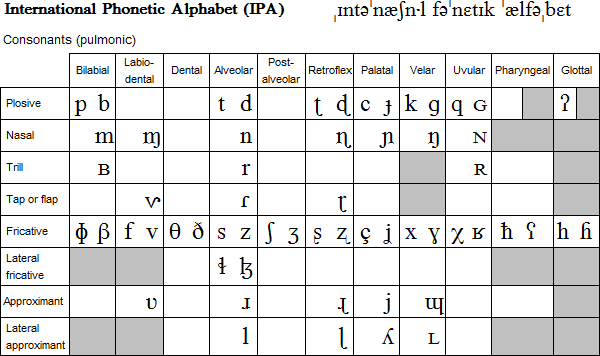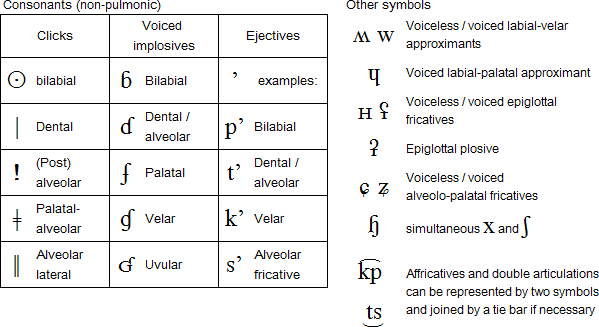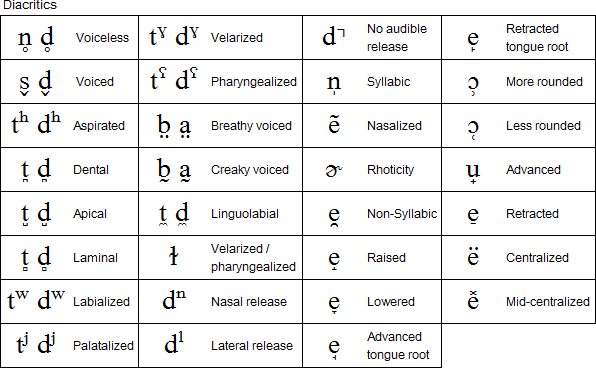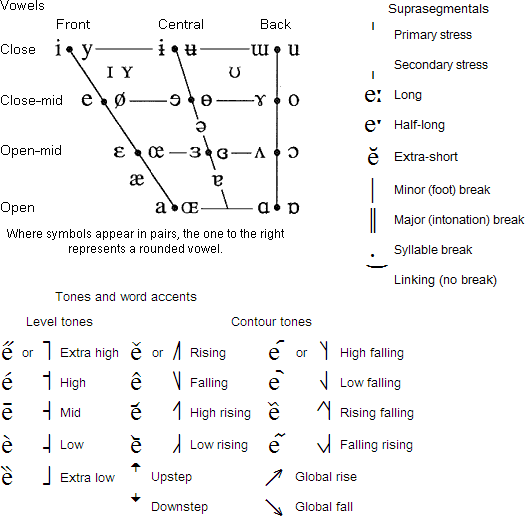Origin
The IPA was first published in 1888 by the Association Phonétique Internationale (International Phonetic Association), a group of French language teachers founded by Paul Passy. The aim of the organisation was to devise a system for transcribing the sounds of speech which was independent of any particular language and applicable to all languages.A phonetic script for English created in 1847 by Isaac Pitman and Henry Ellis was used as a model for the IPA.
Uses
- The IPA is used in dictionaries to indicate the pronunciation of words.
- The IPA has often been used as a basis for creating new writing systems for previously unwritten languages.
- The IPA is used in some foreign language text books and phrase books to transcribe the sounds of languages which are written with non-latin alphabets. It is also used by non-native speakers of English when learning to speak English.

Where symbols appear in pairs, the one on the right represents a voiced consonant, while the one on the left is unvoiced. Shaded areas denote articulations judged to be impossible.



Download an Excel spreadsheet containing the IPA
How the sounds of English are represented by the IPA
Links
Online phonetics and phonology lessonshttp://www.unil.ch/ling/page30184.html
http://www.unil.ch/ling/page12580.html (en français)
http://www.uiowa.edu/ acadtech/phonetics/
UCLA Phonetics Lab Data
http://www.phonetics.ucla.edu
IPA charts (include recordings of each phoneme)
http://www.paulmeier.com/ipa/charts.html
http://www.shef.ac.uk/ipa/symbols.php
http://www.linguiste.org/phonetics/ipa/chart/keyboard/
http://www.ipa.webstuff.org
IPA, International Phonetic Association
http://www.langsci.ucl.ac.uk/ipa/
Free IPA fonts
http://scripts.sil.org/cms/scripts/page.php?site_id=nrsi&id=FontDownloadsIPA
http://www.phon.ucl.ac.uk/home/wells/fonts.htm
http://www.wazu.jp/gallery/Fonts_IPA.html
IPA-4-Linguists - a guide to using the IPA on your computer
http://ipa4linguists.pbworks.com/
IPA trainer
http://www.ipatrainer.com
Online IPA input
http://ipa.typeit.org
http://www.i2speak.com
http://weston.ruter.net/projects/ipa-chart/view/keyboard/
Representation of IPA with ASCII
http://www.blahedo.org/ascii-ipa.html
http://en.wikipedia.org/wiki/X-SAMPA









.jpg)
.jpg)

.jpg)





0 comments:
Post a Comment
Note: Only a member of this blog may post a comment.